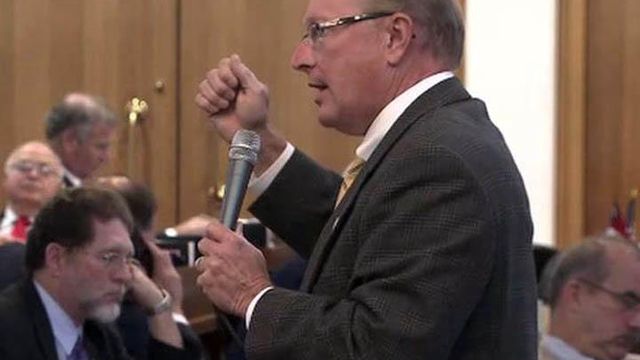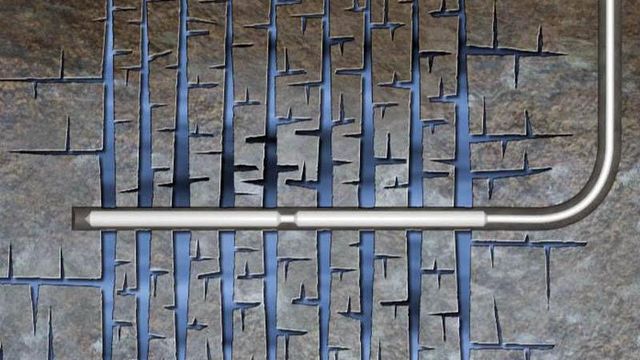House approves gas drilling in NC
After a three-hour debate Thursday, the state House approved legalizing natural gas exploration in North Carolina, including a drilling method that environmentalists say could contaminate water supplies.
Posted — UpdatedThe bill returns to the Senate, which approved it last week mainly along party lines, for a final vote to concur with changes adopted by the House before heading to Gov. Beverly Perdue's desk.
Sen. Robert Rucho, R-Mecklenburg, who sponsored the bill, has said he is on board with the House changes, and the measure is expected to easily win final approval.
The Republican-led House beat back several amendments by Democratic lawmakers seeking to slow down the process, which House Minority Leader Joe Hackney said would cause "social disruption" in rural Chatham, Lee and Moore counties, where the greatest pocket of natural gas lies.
The Democrats expressed concern over hydraulic fracturing, which involves drilling horizontally into underground deposits of shale rock and injecting a high-pressure mix of chemicals, water and sand into the well to break apart the shale and free trapped natural gas.
They cited studies showing environmental problems in other states where the process, commonly referred to as "fracking," has been going on for years.
Rep. Darren Jackson, D-Wake, said that he doesn't drink the water at his in-laws' home in rural Pennsylvania and doesn't like showering or brushing his teeth because the water has been tainted by nearby gas wells.
"It's not worth it," Jackson said of fracking.
Rep. Pricey Harrison, D-Guilford, called for more study of the environmental impact of fracking before legalizing it in North Carolina, but her amendment failed.
"We're talking about dramatically changing our landscape," Harrison said. "We possibly have the potential for an economic boom, but there's no need to rush into it."
Hackney, D-Orange, agreed, noting that the Department of Environment and Natural Resources has already warned lawmakers it does not have the staff or the money to complete a sweeping study of the potential impacts of fracking over the next seven months, as the measure requires.
"Folks, this really makes no sense," Hackney said. "For a state with no experience in this area to try to put all this together by January 1, 2013? It makes no sense at all."
But Republican supporters of the bill said Democrats were simply trying to delay the process.
Rep. Mitch Gillespie, R-McDowell, noted that researchers suggested drilling for gas in central North Carolina as far back as 1927 and that it was time for the state to start producing energy.
"We've lost decades," said Gillespie, who earlier called for a slower approach but said he had ironed out his differences with the Senate proposal. "A lot of us feel this has gone on long enough."
Republicans noted that fracking would come back before the General Assembly in a couple of years when final regulations are drafted.
"This is in no way a permit that any gas company is coming into this state starting to drill. We will have the last say and the final vote on this after the study is done," said Rep. Jamie Boles, R-Moore.
"If you want to vote no, vote no 2½ years from now," Gillespie said.
Rep. Grier Martin, D-Wake, said, however, that the door to drilling in North Carolina will never close once it's been opened.
"We all know how it works. It's not going away," Martin said. "This bill takes us too fast down an uncertain road."
Gillespie called the proposal the strongest fracking bill in the nation, noting that it includes extensive consumer protections like giving property owners three days to cancel any deal to sell mineral rights to their land and written disclosures about the impact such sales could have on mortgages. Drilling companies also would have to disclose the chemicals they use to state regulators.
The House bill also replaces oil and gas developers on the state commission with local governmental officials and a representative of a publicly traded natural gas company.
Under the proposal, DENR and the Mining Commission would be required to complete their studies by the beginning of 2013, and rules would have to be written and approved by October 2014.
The Environmental Defense Fund called those deadlines "arbitrary and irresponsible."
"State agencies are being forced to write regulations in the dark,” Jane Preyer, director of the group's Southeast office, said in a statement. “North Carolina must not write regulations without facts on impacts to communities, the environment and public health. ... It makes no sense for the legislature to race this fast on such a big decision for the state."
Rep. Chuck McGrady, R-Henderson, broke ranks with his fellow Republicans, saying the rush to drill puts the cart before the horse and has polarized the state. Another Republican, Bryan Holloway, also voted against the measure. Commissioners in his Stokes County district have taken a strong position opposing fracking.
Two Democrats voted in favor of the proposal: Reps. Kelly Alexander and Rodney Moore, both from Mecklenburg County.
• Credits
Copyright 2024 by WRAL.com and the Associated Press. All rights reserved. This material may not be published, broadcast, rewritten or redistributed.






